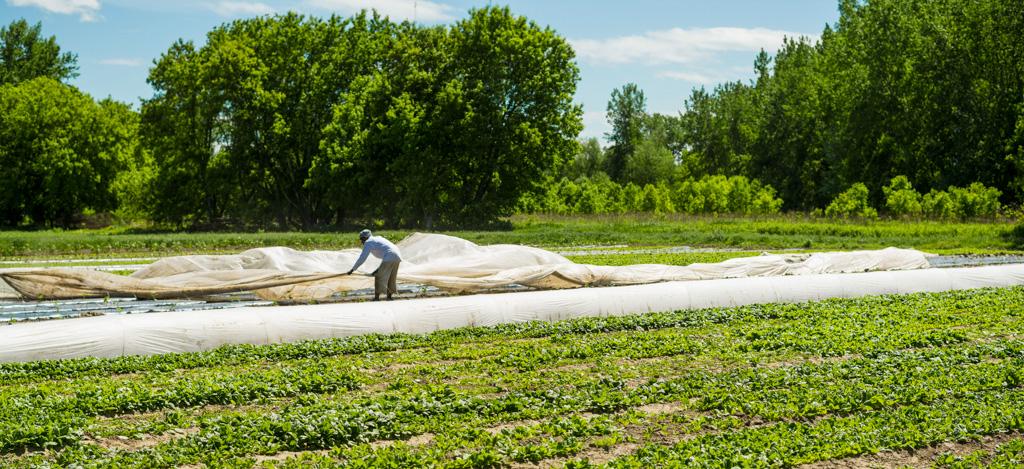October 3, 2025
In 2022, NOFA-VT was awarded a Henry P. Kendall Foundation New England Food Prize for a collaborative project with the University of Vermont, Sodexo Vermont First, University of Vermont Medical Center, and Vermont Bean Crafters. The project was designed to leverage institutional purchasing relationships to facilitate Vermont’s dry bean supply chain, and perhaps most importantly, re-establish the viability of Vermont dry bean production in the process.
Project team member Joe Bossen, Founder & Owner of Vermont Bean Crafters and farmer at Cloud Water Farm, has spent decades working to localize the production and market for staples like legumes and grains here in the Northeast. Over a century of corporate consolidation and farm policies favorable to large-scale agribusiness in the Mid- and Mountain-West have largely dismantled the supply chain infrastructure that once supported these crops in Vermont, making them expensive to grow and often overlooked as commercial ventures. Yet, localizing these crops remains essential for our vibrant agricultural economy, food security, and resilient working landscape.
With his deep expertise in northeastern dry bean production and markets, Bossen recognized that post-harvest processing equipment was a critical fulcrum for making Vermont bean production viable. Thanks to the New England Food Vision Prize investment, we purchased over $140,000 of key equipment, including an optical sorter, a mobile batch dryer, pest-proof containers for inventory management, and a no-till planter, radically improving the financial viability of dry bean production in the state.
Farmers have responded with enthusiasm. Over the course of our two-year project, both vegetable and dairy farmers diversified their production to include dry beans. To support first-time growers, Vision Prize funding secured two of the state’s most highly regarded agronomists, who provided one-on-one technical assistance to participating pilot growers. Interest is expected to continue growing, especially with a supportive outlet like Vermont Bean Crafters, which delivers Vermont-grown beans to large institutional and retail markets across the state and region. Project partners at Sodexo’s Vermont First program and the University of Vermont’s Dining Services have been instrumental, annually committing to consistently feature Vermont Bean Crafters (VBC) products and creating a secure market for this emerging supply of Vermont organic beans.
The project focused on introducing a pre-cooked and frozen Vermont organic black bean burger, made possible by the equipment purchases outlined above. Without that equipment, there would have been insufficient Vermont organic dry bean supply for a product line at this scale. Prior to this investment, VBC’s pre-cooked and frozen product line relied primarily on New York-grown beans. With local supply now in place along with regular partner meetings, coordination, and promotion, UVM’s purchasing of the Vermont-specific product rose nearly 300% from 2022 to 2023, followed by an additional 24% growth in sales in 2024. Across all buyers, VBC saw a 200% growth in sales from 2022 to 2023 for this product. These figures demonstrate strong market demand for a local, organic, plant-based protein that meets the time-saving needs of a labor-hungry food service industry.
As one UVM Dining chef noted, “The Vermont Bean Crafters pre-cooked black beans are a chef’s best friend. They are local, organic, and so easy to use. Just let them thaw and incorporate them into any dish. No need to fight with and drain #10 cans!”
Building on this success, NOFA-VT worked with VBC to expand into other institutional sectors too, starting with K-12 schools. To address the challenge of ensuring a price point that would work for all parties, we worked with Harley Sterling, the School Nutrition Director of Windham Northeast Supervisory Union—and leader of the state’s School Food Authority with the highest percentage of local food purchasing—to analyze the numbers. He showed that positioning the local bean burger as an affordable center-of-plate protein, rather than an expensive side, would be the most effective strategy. We learned from Sterling that Vermont school nutrition directors typically budget $0.50–$0.75 per protein serving, and the VBC burger, at $0.55 per serving and already cooked, fits perfectly within that range. Using this strategy, we promoted the burger as a budget-friendly protein that supports plant-based and culturally relevant menu planning.
After decades of work localizing our state’s and region’s staples, Joe Bossen’s longtime vision is coming to fruition: local, organic beans are in demand at a scale previously thought inconceivable. Over this award’s two-year performance period, dry bean production has become a viable option for a growing number of Vermont farms, the market is expanding, and last but certainly not least, local food access is expanding for eaters at some of the state’s largest public institutions. We are deeply grateful to the Henry P. Kendall Foundation for recognizing the potential of this work and all the farmers and partners making it possible.

